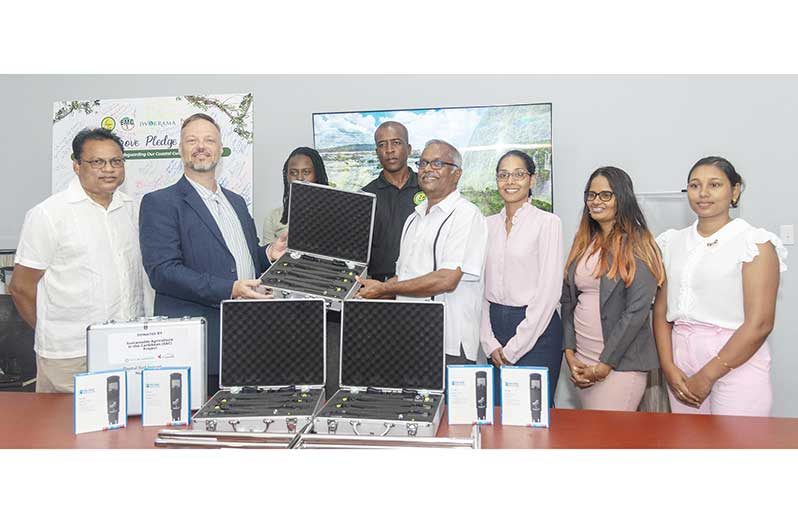-extension officers trained to use, maintain new equipment
EXTENSION officers at the National Agricultural Research Extension Institute (NAREI) were, on Thursday, trained in the use, maintenance and handling of soil testing probes.
The soil testers were handed over to NAREI by the World University Service of Canada (WUSC) Caribbean (Guyana) Inc., which implemented the Sustainable Agriculture in the Caribbean (SAC) Project. They will be utilised on farms to test the soil for organic content matter, pH, microbial activity and much more.
The one-day training had a total of two sessions. One dealt with the usage, maintenance and handling of the soil testing probes, while the other was a more hands-on training in the use of the probes.
Speaking at the opening ceremony, the Chief Executive Officer of NAREI, Jagnarine Singh, said that the soil testers may be small but they will make a big impact in agriculture locally.
As Guyana moves ahead with its plans to become a major contributor to the 25 by 2025 initiative, NAREI continues to work to ensure it meets the mandate so that it can continue to not only expand agriculture, but also to make a difference in the lives of every person involved in the sector.
NAREI Research Scientist, Tracy Persaud, explained that the idea behind the handing over of the soil testing equipment was centred around helping the extension team to better conduct on-site (or farm) soil testing, so that they can get an analysis of the soil and make informed decisions on the spot.
“Initially, when you take soil samples from the farmers, it has to go to the lab, it takes around two weeks to get the analysis, but with these soil probes, you can make informed decisions on the farm, whether you have to make recommendation for limestone, fertiliser or organic matter to be added to the soil,” she explained adding that the idea is to have farmers make decisions right there on the farm, instead of having to wait two weeks to do so.
Meanwhile, the Head of Development Cooperation at the Canadian High Commission, Adam Loyer, stated that NAREI’s role in delivering extension support to farmers was crucial to the scaling and transfer of agricultural best practices.
He pointed out that NAREI’s expertise and reach will ensure that the benefits of the initiative extended beyond the training room.
Speaking directly to the extension team, Loyer said: “Extension team, as you leave here and begin to cascade this training to farmers, remember that each soil test you conduct, each piece of advice you give, contributes to building a more resilient and productive agricultural sector in Guyana.
“Use these tools to diagnose issues, recommend solutions, and support farmers in implementing them. With your help, we can ensure that Guyanese agriculture remains productive, profitable and sustainable for generations to come.”
Loyer further commended the efforts of stakeholders involved in the SAC project, including the NAREI team for their continued commitment to the shared vision of food system transformation.
The WUSC Caribbean (Guyana) Inc. implemented a Government of Canada-funded SAC project in 2022, which targets women, youth (both female and male), and marginalised male farmers. The SAC team partners with government agencies in the implementation of its mandate. One such entity is NAREI.




.jpg)










